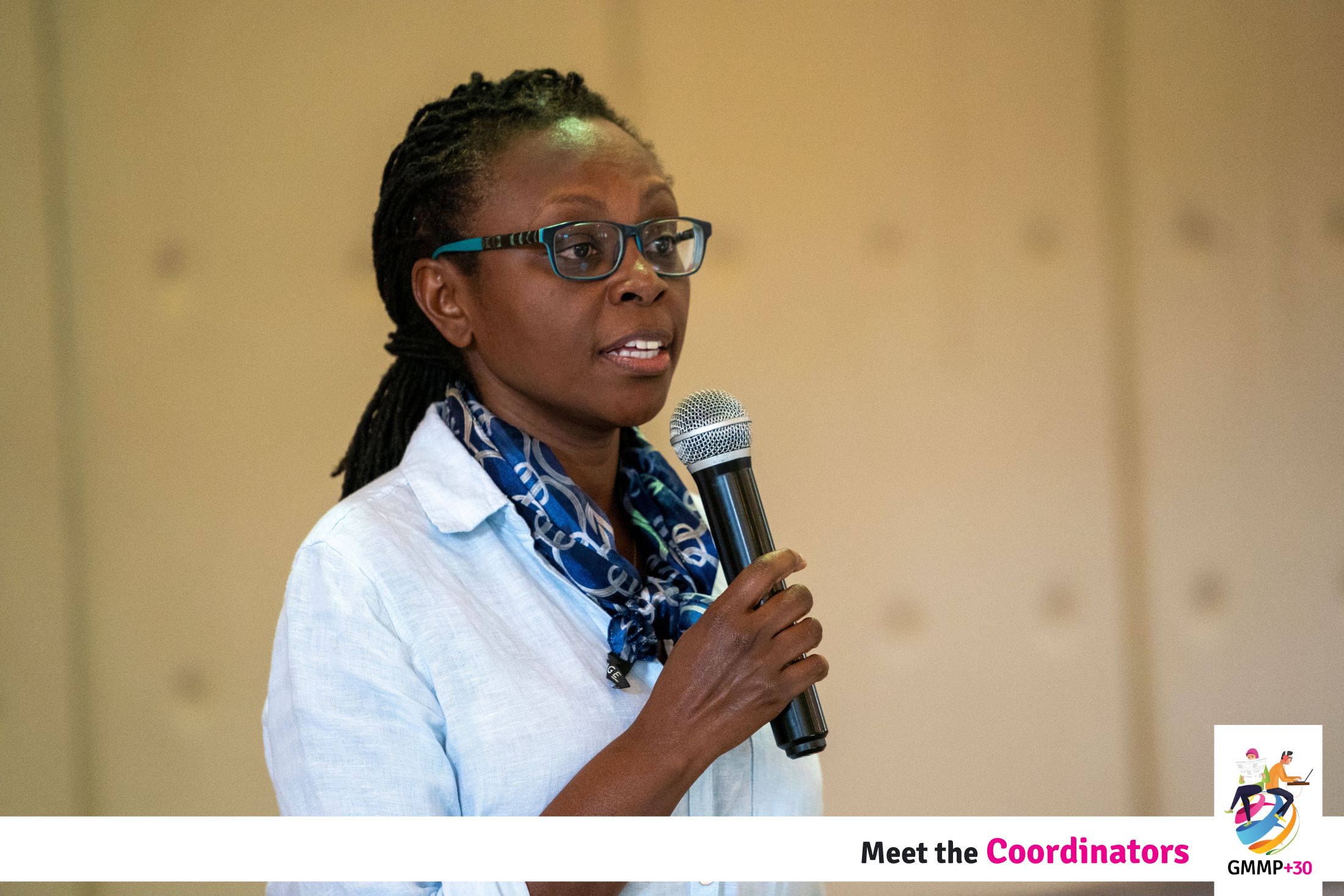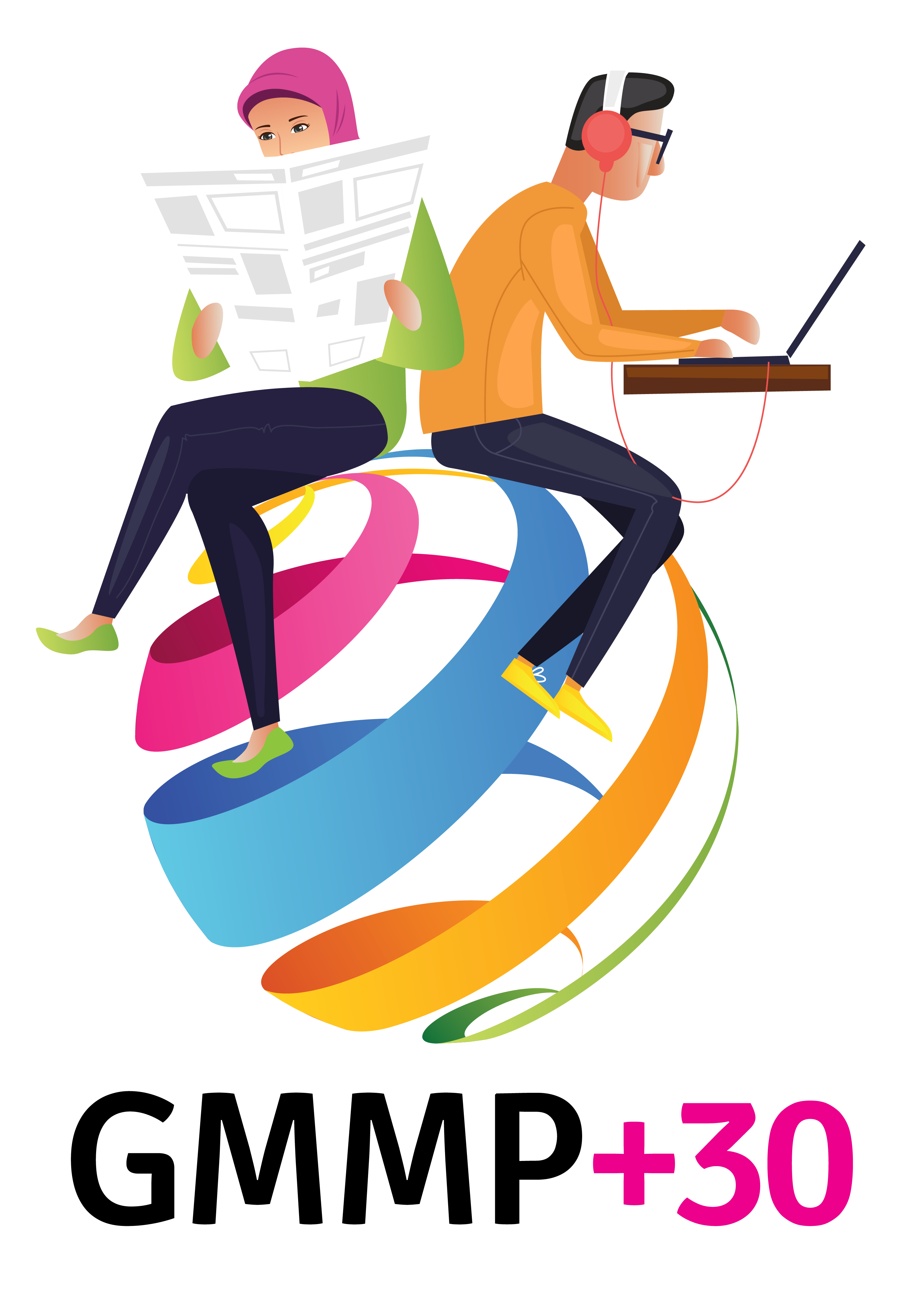
03 Oct Meet GMMP Global Coordinator Sarah Macharia
Discover the people, organizations, and contexts behind the data as we move towards the 7th edition of the Global Media Monitoring Project (GMMP) in 2025. GMMP Global Coordinator Sarah Macharia kicks off our “Meet the Coordinators” interview series with a look past, present, and future at the groundbreaking transnational project working to advance gender equality in and through the media.
Next year will mark the 30th anniversary of the GMMP, with six editions of monitoring gender equality in the news. Progress towards equal representation and gender-just portrayal of women in mainstream news media remains painfully slow. What impact has the GMMP had? How has it responded to the recommendations in key global policy mandates to advance gender equality in and through the media?
Indeed, 2025 will mark 30 years since the first global monitoring. The 30-year anniversary is shared with the historic Beijing Platform for Action adopted at the 4th UN World Conference on Women in 1995.
The very first GMMP influenced recognition of media monitoring in the Beijing blueprint as a tool for change towards gender equality and empowerment of women and girls.
Under Strategic Objective J1 in the Platform for Action, non-governmental organizations and media professional associations were encouraged to establish “media watch groups that can monitor the media and consult with the media to ensure that women’s needs and concerns are properly reflected.”
This action is one among others necessary to “increase the participation and access of women to expression and decision-making in and through the media and new technologies of communication” (Strategic Objective J1).
The GMMP – methodology and findings – have accompanied gender equality movements worldwide since then, providing evidence for advocacy, awareness, and capacity-building. The consistent findings have exposed media gender bias as real, quantifiable in hard statistics, with effects on the lived experiences of women and girls.
This transnational project spanning over 100 nations has made an unmatched contribution of knowledge about the pervasiveness and persistence of bias, stereotyping, and discrimination based on gender identity.
GMMP findings continue to lend strength to policy advocacy by civil society outside and within the media industry. A testament to the GMMP’s relevance to policy-making is in citations by intergovernmental bodies such as the Council of Europe and the Africa Union, by regional policy thinktanks such as the Caribbean Policy Development Centre and by national NGOs such as the Swedish Women’s Lobby.
Indications on its importance for building critical awareness about media content are in the integration of GMMP reports in course materials for high schools and tertiary institutions. The case for the GMMP’s relevance to academic research is made by the almost 3,500 journal articles produced by a search on Google Scholar.
Progress towards gender equality in and through the news media may be slow but what’s important to note, is that there is progress.
The GMMP is like a corrective lens, helping us see clearly the areas needing intervention.
For example, the findings made it possible to flag inertia in advancing gender balance in persons interviewed as experts. Various initiatives sprouted to break the cycle through compilation of directories of women specialists in different fields. By 2020, the finding was changed dramatically, increasing by several points towards equality.
Data create awareness of the status and consciousness about areas where action is needed.
Many people might associate the GMMP with the global media monitoring that has taken place every five years since 1995. What else is happening with the GMMP, how does it work in between monitoring editions to advance gender equality in and through the news media?
Importantly, the GMMP is responsible for galvanizing a global mass movement for gender equality in and through the media. The fascinating statistics often obscure the fact that there is a transnational movement responsible for their collection.
This interview series will give readers a glimpse into the GMMP network present in more than 100 countries, who we are and what motivates us. The network is largely self-funded and is comprised of women’s civil society groups, associations and unions of women media workers, university researchers and many others.
In between the global monitoring years, the network is engaged in a slew of change actions. National teams map out five-year action plans informed by the evidence. Examples of actions are numerous theme-based media monitoring projects, such as those by Uks Media Research Centre in Pakistan and the Uganda Media Women’s Association to monitor misogyny on social media platforms.
One important consequence of theme-based monitoring is to derive lessons from the experience for the quinquennial revision of GMMP tools. Revision is part of the preparatory process for the global monitoring editions to improve methodological rigour and ensure pertinence of the findings for emerging challenges to women’s communication rights and gender equality in freedom of expression.
The GMMP comprises a global network of advocates for gender equality in the media who contribute their time and resources – the human faces behind the data, so to speak. How do you maintain the vitality of the network and promote its renewal and expansion?
Network members have a symbiotic relationship that makes self-nurturing and self-renewal possible to some extent. The world of actors seeking to influence gender equality in the media sector is remarkably small compared to other sectors such as education and health.
Webinars, online meetings, in-person workshops and conferences are common gathering spaces. The network is connected on social media where members share what they are doing and amplify each other’s work.
You’ve called for re-strategizing to meet current and emerging threats to gender equality and women’s freedom of expression in news media. What changes have taken place in the news landscape since the last GMMP edition in 2020? How are these shaping your approach for the next GMMP edition?
The concerns that drove inception of the GMMP three decades ago remain rife. These included media objectification, commodification, sexualization and lack of respect for the dignity of women. The issues have persisted but more than this, they have morphed in frightening ways particularly via and in networked technologies. The GMMP methodology, indicators and analytical approach continually seek to adapt to the times.
In 2020 for example, we adapted the methodology, approach, indicators and analysis to respond to the Covid-19 health crisis that was set to impact the object of study (news content) and the ways of working (in lockdown situations). The news media industry had rapidly changed, as had the ways in which news audiences accessed content.
Five years on, re-strategizing is important to harness opportunities and mitigate threats brought on by Artificial Intelligence. Just this week a news item that I had read and thought to be a terrible turn of events turned out to be fake AI-generated news. A story so believable that it had been carried on numerous reputable outlets! The minefield that is today’s mainstream news landscape will need to be approached with caution. A re-think of the GMMP methodology and approach is crucial.
Where are plans at for a seventh GMMP in 2025? What coordination has taken place, what is envisioned in the coming weeks and months? How can advocates for gender-just media get involved?
GMMP planning is well underway. Beginning late 2023 to early 2024, we held regional consultations of national coordinators to check in and plan for the 2025 edition. The process of confirming coordinators and knowledge management to pass the baton to incoming coordinators continues.
The GMMP’s technical advisory group will deliberate and make decisions on revisions to the methodology, instruments and indicators during the final quarter of 2024. The draft instruments will be pilot-tested and finalized thereafter. Training on the updated instruments will follow in preparation for the monitoring in 2025.
GMMP Global Coordinator Sarah Macharia. Photo: Gregg Brekke Media

Get involved with a GMMP+30 team near you. Contact us to find out how.

Sorry, the comment form is closed at this time.